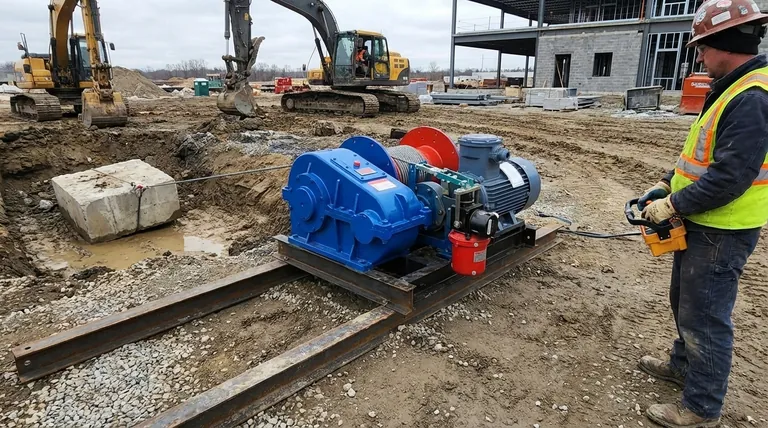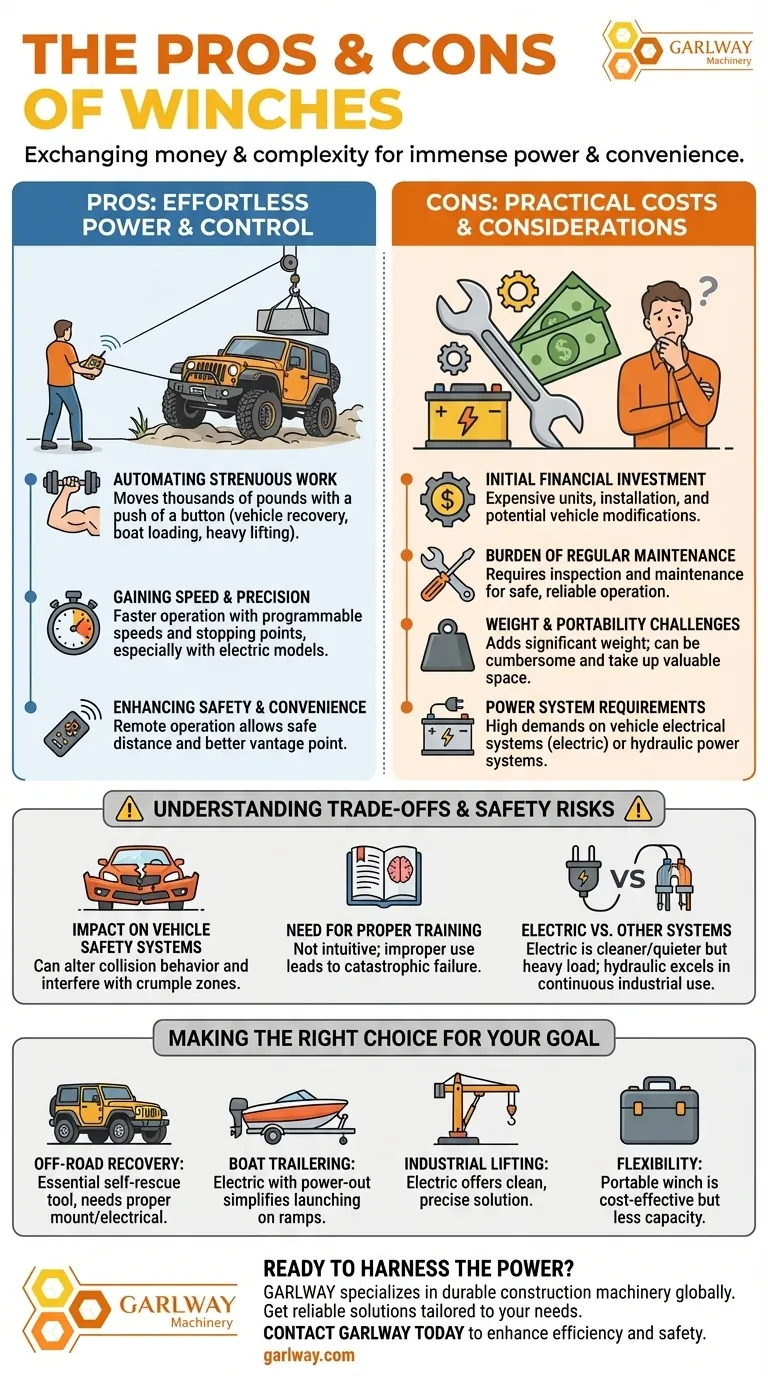Ultimately, a winch is a tool that exchanges money and complexity for immense power and convenience. It automates physically demanding tasks like vehicle recovery, boat loading, or heavy lifting, but requires a significant initial investment, ongoing maintenance, and a commitment to safe operation.
The core decision to use a winch is a trade-off. You gain significant pulling and lifting capability that would otherwise be impossible, but you accept the costs of installation, maintenance, and the responsibility of operating powerful and potentially dangerous equipment.

The Core Advantage: Effortless Power and Control
A winch's primary purpose is to provide mechanical advantage, turning a difficult or impossible manual task into a manageable, automated process.
Automating Strenuous Work
A winch allows a single person to move objects weighing thousands of pounds with the push of a button. This is its most obvious and compelling benefit.
Whether recovering a vehicle stuck off-road, pulling a heavy boat onto a trailer, or lifting materials at a work site, the winch does the hard work.
Gaining Speed and Precision
Electric winches, in particular, offer significant speed and control over manual methods. Their operation is faster and less physically taxing.
Advanced electric models can offer programmable speeds and stopping points, allowing for highly precise and repeatable operations essential in industrial settings.
Enhancing Safety and Convenience
Many modern winches can be operated via a remote control. This allows the operator to stand at a safe distance, providing a better vantage point and keeping them away from a potentially snapping line.
This convenience is especially valuable in vehicle recovery, where conditions can be unstable and dangerous.
The Practical Costs and Considerations
The power a winch provides does not come for free. The costs are measured in money, time, and the physical space the equipment occupies.
The Initial Financial Investment
High-quality winches and their required mounting hardware are expensive. The cost extends beyond the unit itself to include installation, which may require vehicle or site modifications.
The Burden of Regular Maintenance
A winch is a piece of mechanical equipment that requires regular inspection and maintenance to function safely and reliably. Neglecting this can lead to equipment failure when you need it most.
Weight and Portability Challenges
Winches are heavy and cumbersome. Permanent installations add significant weight to a vehicle or boat, while even "portable" models can be difficult to handle and store.
On boats, larger reel winches can take up significant and valuable deck space, impacting aesthetics and usability.
Power System Requirements
Winches have significant power demands. Electric winches require a robust vehicle electrical system, while hydraulic models need a hydraulic power system, adding another layer of complexity and cost.
Understanding the Trade-offs and Safety Risks
Operating a winch introduces new risks that must be understood and mitigated. It is not an install-and-forget accessory.
Impact on Vehicle Safety Systems
Adding a heavy-duty aftermarket bumper and winch can alter the way a vehicle behaves in a collision.
Specifically, it can interfere with the engineered crumple zones designed to absorb impact, potentially changing the safety dynamics of the vehicle.
The Need for Proper Training
A winch is not an intuitive tool. Improper use, such as incorrect rigging techniques or failing to maintain the equipment, can lead to catastrophic failure and serious injury.
Electric vs. Other Systems
Electric winches are a popular choice due to their versatility, clean operation (no hydraulic fluid leaks), and relatively quiet performance.
However, they place a heavy load on a vehicle's electrical system and may not be suitable for continuous, heavy-duty industrial use where hydraulic systems often excel.
Making the Right Choice for Your Goal
Your specific goal will determine if the benefits of a winch outweigh its drawbacks.
- If your primary focus is off-road vehicle recovery: A winch is an essential self-rescue tool, but it requires a proper vehicle mount and a healthy electrical system to be reliable.
- If your primary focus is trailering a heavy boat: An electric winch, especially one with a "power-out" feature, dramatically simplifies launching and retrieval on steep or slippery ramps.
- If your primary focus is industrial lifting: An electric winch offers a clean, quiet, and precise solution ideal for workshops and controlled environments.
- If you need flexibility for multiple trailers or tasks: A portable winch is a cost-effective and versatile option, though it won't match the capacity of a permanently mounted unit.
A winch is a powerful force multiplier, and understanding its demands is the first step to using it effectively and safely.
Summary Table:
| Pros | Cons |
|---|---|
| Effortless power for heavy lifting | Significant initial investment |
| Enhanced safety with remote control | Requires regular maintenance |
| Speed and precision in operations | Adds weight and impacts portability |
| Automates strenuous manual tasks | High power system demands |
Ready to harness the power of a winch for your projects? GARLWAY specializes in construction machinery, offering durable winches, concrete mixers, and batching plants for construction companies and contractors globally. Our expertise ensures you get a reliable solution tailored to your needs. Contact GARLWAY today to discuss how our equipment can enhance your efficiency and safety on the job site!
Visual Guide

Related Products
- Electric and Hydraulic Winch for Heavy Duty Applications
- Electric 120V Boat Winch by Badlands
- 12000 lb Heavy Duty Electric Boat Winch
- Heavy Duty Electric Boat Winch Windlass Anchor
- Electric Hoist Winch Boat Anchor Windlass for Marine Applications
People Also Ask
- How long can you run an electric winch? Master Safe, Efficient Vehicle Recovery
- How do I choose an electric winch? A guide to safe and effective pulling power.
- Can an electric winch be used as a hoist? Understand the Critical Safety Differences
- How does the electric winch work? Unlock the Power of Force Multiplication
- Do electric winches have brakes? Essential Safety for Your Heavy-Duty Pulling

















